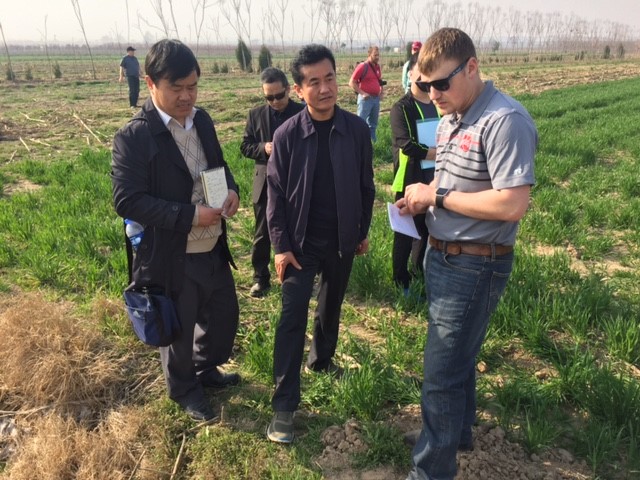
IANR’s Impact is Global…and Growing
Agriculture and natural resources have a unique place in Nebraska and provide the foundation for a number of the University of Nebraska-Lincoln’s international partnerships and initiatives. The Office of Global Engagement in the Institute of Agriculture & Natural Resources (IANR) coordinates the university’s international engagement across these key themes and across IANR’s land-grant mission of education, research and extension.
Nebraska’s expertise in agriculture and natural resources has always drawn partners from around the world, including from international higher education institutions, foreign governments and nonprofit organizations.
- In the 1950s, Nebraska helped found the first land-grant institution in Turkey – Ataturk University.
- In the 1960s IANR led, with the guidance of future Secretary of Agriculture and then-UNL faculty member Clayton Yeutter, an effort to help create the Colombian Agricultural Institute in Bogotá.
- In the 1980s and 90s IANR partnered with USAID and others to lead dryland agricultural research in Morocco.
IANR and its Office of Global Engagement continue to build on this strong foundation, as many of the world’s great challenges today relate directly to our core areas of expertise. Indeed, in IANR, we believe there has never been a time where agricultural, food, natural resources and human sciences have had a greater role to play in improving the human condition and solving some of the biggest challenges of the 21st century.
To ensure maximum impact of the international activity that occurs across IANR’s 1,900 staff and nearly 3,000 students, engagement must be strategic and coordinated. IANR’s Office of Global Engagement provides that coordination, synthesizing policies, programs and initiatives to create a more internationally connected institution where global perspectives are interwoven throughout education, research and service. IANR’s expanded global engagement team, which collectively speaks eight different languages and has expertise in every major world region, serves as the hub of international activity for the institute.
IANR Global Engagement works closely with UNL’s Office of Global Strategies to ensure that these efforts are in sync with campus-wide efforts. According to IANR Assistant Vice Chancellor for Global Engagement Josh Davis, this is one of Nebraska’s advantages.
“One of UNL’s great strengths is that we are both a comprehensive and land-grant university. Working globally on grand challenges requires an interdisciplinary approach. When you combine IANR’s expertise with that of the rest of UNL, we are in a great position to have tremendous impact internationally,” says Davis.
In addition to the hundreds of IANR faculty engaged in research collaborations and educational programming in over 120 countries, there is also strategic depth in key areas around the world. IANR has created geographically diverse relationships to anchor its broader global engagement strategy.
Engagement in Brazil and partnership with the São Paulo Research Foundation (FAPESP) continue to strengthen. IANR faculty received joint collaborative research funding this spring for the second consecutive year, and UNL convened Brazilians and Nebraskans across research, extension and nonprofit realms with the FAPESP WEEK symposium last fall. This summer, IANR faculty will teach and conduct research at the University of São Paulo in areas ranging from beef genetics to ag economics and entrepreneurship.
IANR’s engagement in Rwanda has grown at a rapid rate over the last few years. There are more than 100 undergraduate scholars from Rwanda studying in the College of Agricultural Sciences and Natural Resources (CASNR) and another cohort of 50 students will arrive in August 2018. In addition, IANR had a team on the ground in Kigali in March working with local partners to develop curriculum in conservation agriculture and related fields. Seven CASNR students will complete internships in Rwanda this summer. These various engagements in Rwanda, which directly involve more than two dozen faculty members, are laying the foundation for long-term impact in the country through faculty research and engagement.
Our multi-dimensional engagement in China spans teaching, research and extension and also includes economic development. While UNL students continue to benefit from educational opportunities at Northwest Ag and Forestry University, a dual degree program through the Department of Food Science & Technology, called the "3+1 Program," allows Chinese students to begin their degrees in China and finish them in Nebraska—with the first class arriving fall 2018. The Nebraska-Yangling Demonstration Farm, which is a joint project with the State of Nebraska and Nebraska companies, pools the expertise of research and extension faculty from the two universities, as well as expands economic opportunity for Nebraska-based farm machinery manufacturers and related industry.
IANR’s Office of Global Engagement is always looking for new ways to involve faculty, students and stakeholders across Nebraska. If you would like more information about one of the initiatives highlighted here or are looking for a different opportunity to connect, reach out to us at IANRGlobal@unl.edu or follow us on Twitter at @IANRGlobal.
By Brianne Wolf, Institute of Agriculture and Natural Resources Global Engagement